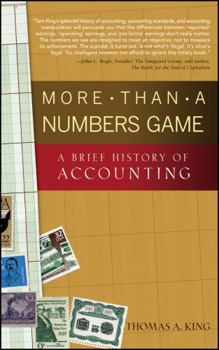More Than a Numbers Game: A Brief History of Accounting
Select Format
Select Condition 
Book Overview
The world certainly suffers no shortage of accounting texts. The many out there help readers prepare, audit, interpret and explain corporate financial statements. What has been missing is a book offering context and discussion for divisive issues such as taxes, debt, options, and earnings volatility. King addresses the why of accounting instead of the how, providing practitioners and students with a highly readable history of U.S. corporate...
Format:Hardcover
Language:English
ISBN:0470008733
ISBN13:9780470008737
Release Date:September 2006
Publisher:Wiley
Length:256 Pages
Weight:1.03 lbs.
Dimensions:0.9" x 6.4" x 9.1"
Related Subjects
Accounting Accounting & Finance Business Business & Investing Finance Popular EconomicsCustomer Reviews
3 ratings
More Than a Numbers Game
Published by Thriftbooks.com User , 16 years ago
This book was received in perfect condition, and arrived in a timely manner. I would recommend this seller!
A Terrific Resource, Though Not for Absolute Beginners
Published by Thriftbooks.com User , 16 years ago
For the right type of reader (e.g., me), "More Than a Numbers Game" is just what the doctor ordered. I know a little about accounting and the stock market, plus I learn things best when they are presented through a historical lens. This book suited my needs perfectly. King's story is focused on accounting in the United States from the late 19th century to the present. Almost every chapter looks at one accounting issue (taxes, debt, stock options, etc.), explains why it poses a problem, and then traces the profession's response to it over time. The chapters are also arranged in a rough chronological order, in that issues that surfaced earlier in time are dealt with earlier in the book. The whole book thus builds toward a climax in the next-to-last chapter, where King lucidly discusses the accounting scandals of the early 2000s, the implosion of Arthur Andersen & Co. (where King once worked), and the adoption of the Sarbanes-Oxley Act. I have learned a tremendous amount from this short book. The dust jacket includes a blurb from John Bogle (founder of Vanguard), in which he says, "No intelligent investor can afford to ignore this timely book." I agree entirely. However, if you're a complete beginner -- if, say, balance sheets and income statements are alien to you -- this book will probably be a little baffling. In that case, you should probably read an "Accounting for Dummies" sort of book before moving on to "More Than a Numbers Game."
Nice introduction, albeit "fun" is a stretch
Published by Thriftbooks.com User , 17 years ago
T. King is a lucky guy: he loves his profession. In the preface to this book, he assures us that accounting is fun. Despite his letting the reader in on a professional in-joke or two, I confess that I wasn't won over to this point of view. Nor is his writing style so compelling that I'm confident I'd have slogged through to the end even if I hadn't been reading the book for work. But he definitely gives a clear and useful overview of the different kinds and purposes of accounting (especially financial, tax and cost accounting) and a sense of the intellectual challenge inherent in some accounting issues. The book isn't a history in a chronological sense, but rather a series of histories of some selected topics, such as tax accounting, accounting standards, treatment of inflation, accounting principles, etc. TK walks us through the history of the pronouncements of various self-regulatory bodies on each of these subjects, to give us a sense of the depth of the issue and the political and business controversies surrounding it. For this non-accountant, though, a lot of his historical discussion wound up feeling moot. By the end of the day there's usually some accounting standard that either chooses a rule or capitulates to confusion, which is all you need to know from a practical point of view. The historical meanderings leading up to such denouements don't exactly burn up the page with drama or suspense. The second half of the book has got more of a build to it, covering financial accounting topics very familiar from recent news stories, such as intangibles, debt, options, earnings and Sarbanes-Oxley (including the Enron et al. meltdowns that stimulated that legislation). In these chapters, TK gives a very nice historical perspective on the fickleness of investor preferences and especially on the destructiveness of investors' preoccupation with earnings per share. I'm not sure I agree with him that if only CEOs and accountants believed in the Efficient Markets Hypothesis, Capital Asset Pricing Model and Black-Scholes all would be well with the financial accounting world. But investors and other interested non-specialists can learn the big-picture context of some timely accounting issues, and how to consider those issues with a critical perspective. A very solid four stars.






